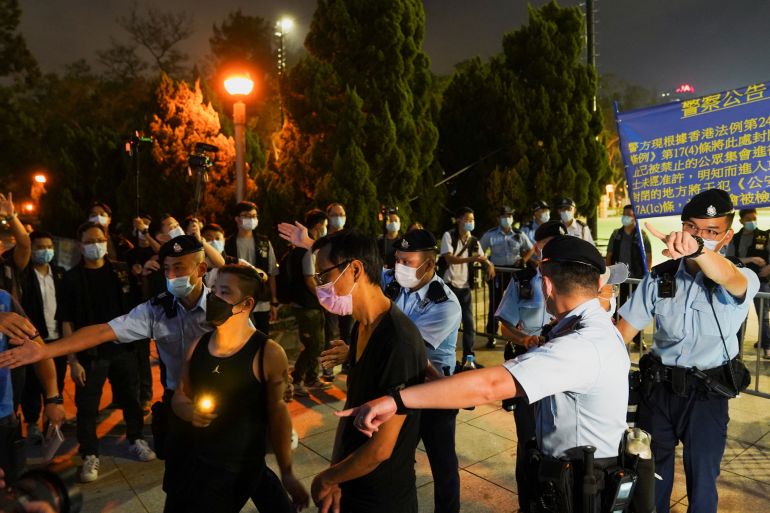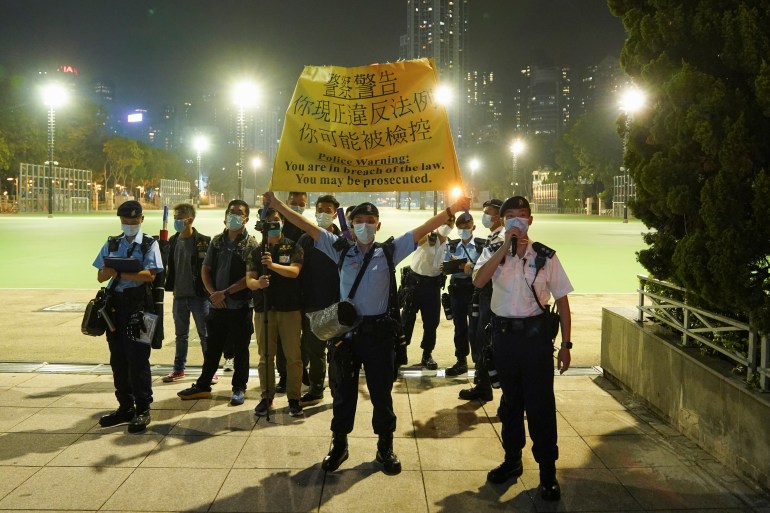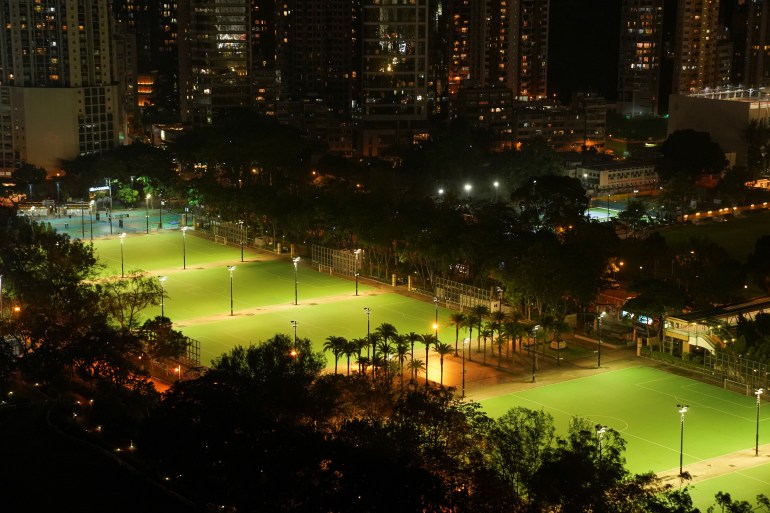Tiananmen vigil stifled but HK activists say history ‘not erased’
Hong Kong police out in force to stop demonstrators marking the 32nd anniversary of the Tiananmen Square massacre in Beijing.

Hong Kong, China – With heavy police presence in the heart of Hong Kong having all but snuffed out any commemoration of the 32nd anniversary of the Tiananmen Square massacre, Kit and a few hundred others hoped on Friday to find sanctuary in a blue-collar neighbourhood.
Rosary in hand, the 37-year-old social worker joined a queue that started snaking around St Francis of Assisi’s Church, as early as two hours before the memorial mass.
Keep reading
list of 3 itemsHong Kong teacher records fastest Everest ascent by a woman
Free flights, lotteries, cash: Hong Kong’s vaccine incentives
“It feels like a pilgrimage to me,” said Kit, who declined to give her surname. “People here still have the means to remember. The police’s action doesn’t erase what happened.”
On June 4, 1989, the Chinese government deployed armed troops to crush a student-led protest on Tiananmen Square in Beijing. At least hundreds of pro-democracy protesters and bystanders, if not more, are believed to have been killed.
For 30 years since the incident, Hong Kong has held a mass candlelight vigil for all those who perished without any interference from authorities.
But for the second year in a row, just as Beijing drastically tightened control over the freedoms of speech and assembly in Hong Kong, the gathering in the semi-autonomous territory was banned, ostensibly due to coronavirus restrictions.
Of the few thousands who defied last year’s ban and gatecrashed into the city’s central park to hold the vigil, 26 of them, mostly prominent pro-democracy figures, have since been charged with taking part in the unauthorised rally. Last month, student leader Joshua Wong was given a 10-month prison sentence after pleading guilty to taking part in last year’s vigil.
Following the imposition by Beijing last June of the National Security Law, which criminalises activities deemed to be secession, subversion and collusion with foreign forces, Hong Kong Secretary for Security John Lee warned that anyone who breached this year’s ban may risk a maximum sentence of five years.
A former British colony, Hong Kong was returned to China in 1997 under the “one country, two systems” framework, which guaranteed Hong Kong people rights and freedoms largely absent in mainland China, where commemorations of the Tiananmen crackdown are strictly banned.
The families of those shot dead by Chinese soldiers are placed under surveillance on every anniversary, while even private commemorative gestures are penalised.
In Hong Kong, however, the annual vigil has over the years drawn tens of thousands of people as generations of people pledged “to never dare forget”. The event was spearheaded by the Hong Kong Alliance in Support of Patriotic Democratic Movements in China, a coalition originally formed in 1989 to aid the mainland protesters.
But as a new generation has grown up alienated from the mainland, the young people chafe at the alliance’s twinning of Chinese patriotism and Hong Kong’s own fight for democracy. In recent years, many student activists tended to boycott the alliance’s vigil.
As a freshman in 2016, Jerry Yuen was one of them. But after one of his best friends and fellow activists was among those charged and has since fled overseas into exile, Yuen, 23, has had a change of heart. A few days ago, he posted a video online rallying his peers to keep up the collective remembrance.
Calling the annual commemoration “Hong Kongers’ political custom”, Yuen said: “What I care the most is whether we’ll still put up a fight.”

Some of those who have made a stand publicly and early have been pre-emptively arrested.
Having been attending the alliance’s vigil since she was a child, Chow Hang-tung, 37, aired her plans on Facebook to keep her lifelong commitment by lighting a candle at the park. Chow was hauled by police from her law practice on Friday morning.
In a recent interview with Al Jazeera, Chow, the alliance’s vice chairwoman, said: “I hope by now Hong Kongers realise only a democratic China can ensure their rights, and that the fight for democracy here is part of the larger fight.”
By late afternoon, a phalanx of police officers fanned out to seal off the park. As night fell, gaggles of mourners lighting candles in the shopping district nearby were broken up by authorities.
In a thoroughfare or main drag in Kowloon, a convoy of police wagons parked in the fast lane and snarled rush-hour traffic to a crawl. One student activist attempting to screen on the sidewalk a few blocks away a documentary on the massacre was arrested.
To head off harassment by police, many opted to lie low but don the sartorial statement of commemorating: dress in black, the colour code in a traditional Chinese funeral. A few of the pro-democracy activists in detention, including Chow, chose to fast to mark the date.
Meanwhile, queueing outside the church, Alicia, who preferred not to give her surname, hoped for an uneventful night.
“It seems to me this is the only avenue left to commemorate in,” said Alicia. “I’m here to make myself heard. Our spirit will persevere.”
